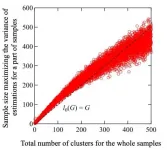Genome sequencing shows coronavirus variation drives pandemic surges
Fusing classical epidemiology and genomics is a tool for future pandemics
2021-04-01
(Press-News.org) Genome sequencing of thousands of SARS-CoV-2 samples shows that surges of COVID-19 cases are driven by the appearance of new coronavirus variants, according to new research from the School of Veterinary Medicine at the University of California, Davis published April 1 in Scientific Reports.
"As variants emerge, you're going to get new outbreaks," said Bart Weimer, professor of population health and reproduction at the UC Davis School of Veterinary Medicine. The merger of classical epidemiology with genomics provides a tool public health authorities could use to predict the course of pandemics, whether of coronavirus, influenza or some new pathogen.
Although it has just 15 genes, SARS-CoV-2 is constantly mutating. Most of these changes make very little difference but sometimes the virus becomes more or less transmissible.
Weimer and graduate student DJ Darwin R. Bandoy initially analyzed the genomes of 150 SARS-CoV-2 strains, mostly from outbreaks in Asia prior to March 1, 2020, as well as epidemiology and transmission information for those outbreaks. They classified outbreaks by stage: index (no outbreak), takeoff, exponential growth and decline. The ease of transmission of a virus is set by the value R, or reproductive number, where R is the average number of new infections caused by each infected person.
They combined all this information into a metric called GENI, for pathogen genome identity. Comparing GENI scores with the phase of an epidemic showed that an increase in genetic variation immediately preceded exponential growth in cases, for example in South Korea in late February. In Singapore, however, bursts of variation were associated with smaller outbreaks that public health authorities were able to quickly bring under control.
20,000 virus samples
Weimer and Bandoy then looked at 20,000 sequences of SARS-CoV-2 viruses collected and from February to April 2020 in the United Kingdom and compared them with data on cases.
They found that the GENI variation score rose steadily with the number of cases. When the British government imposed a national lockdown in late March, the number of new cases stabilized but the GENI score continued to rise. This shows that measures such as banning gatherings, mask mandates and social distancing are effective in controlling spread of disease in the face of rapid virus evolution.
It could also help explain "superspreader" events when large numbers of people get infected in a single incident where precautions are relaxed.
Weimer said he hopes that public health authorities will take up the approach of measuring virus variation and linking it to the local transmission rate, R.
"In this way you can get a very early warning of when a new outbreak is coming," he said. "Here's a recipe for how to go about it."
INFORMATION:
Parts of the work previously appeared online as a preprint. Bandoy is sponsored by the Philippine California Advanced Research Institute.
ELSE PRESS RELEASES FROM THIS DATE:
2021-04-01
Hamilton, ON (April 1, 2021) - People living with the often-debilitating effects of Crohn's disease may finally gain some relief, thanks to ground-breaking research led by McMaster University.
McMaster investigator Brian Coombes said his team identified a strain of adherent-invasive E-coli (AIEC) that is strongly implicated in the condition and is often found in the intestines of people with Crohn's disease.
"If you examine the gut lining of patients with Crohn's disease, you will find that around 70 to 80 per cent of them test positive for AIEC bacteria, but one of the things we don't understand is why," said Coombes, professor and chair of the Department of Biochemistry and ...
2021-04-01
Ishikawa, Japan - Any high-performance computing should be able to handle a vast amount of data in a short amount of time -- an important aspect on which entire fields (data science, Big Data) are based. Usually, the first step to managing a large amount of data is to either classify it based on well-defined attributes or--as is typical in machine learning--"cluster" them into groups such that data points in the same group are more similar to one another than to those in another group. However, for an extremely large dataset, which can have trillions of sample points, it is tedious to even group data points into a single cluster without huge memory requirements.
"The problem can be formulated as follows: Suppose we have a clustering tool that ...
2021-04-01
The kangaskhan, Australia's only species of endemic Pokemon in Pokemon Go, is commonly poached within its natural habitat by Pokemon trainers for use in fighting contests
Researchers used several species distribution modeling algorithms to predict how climate change, on top of the already existing human-induced pressures, would impact the distribution of the kangaskhan in the future
In addition to this, they found a way to measure how biased commonly used species distribution models are, and found that some models are so biased that their results weren't influenced by the data at all
The ...
2021-04-01
Obesity rates have increased dramatically in developed countries over the past 40 years -- and many people have assumed that food marketing is at least in part to blame. But are people with obesity really more susceptible to food marketing? And if they are, is that a permanent predisposition, or can it change over time?
According to a new study by UBC Sauder School of Business Assistant Professor Dr. Yann Cornil (he/him/his) and French researchers, people with obesity do tend to be more responsive to food marketing -- but when their weight drops significantly, so does their responsiveness to marketing.
For the study, which was published in the Journal of Consumer Psychology, the researchers followed three groups: patients with severe ...
2021-04-01
Oak Brook, IL - The April edition of SLAS Discovery is a special issue on advances in protein degradation curated by guest editors M. Paola Castaldi, Ph.D., and Stewart L. Fisher, Ph.D.
Targeted protein degradation has generated interest within the drug discovery arena due to the inhibition of one particular function of a protein not often delivering the successful results that comes from whole-protein depletion. The pharmacology of PROTACs present challenges, however, namely for the development of orally bioavailable drugs. In the article "Target Validation Using PROTACs: Applying the Four Pillars Framework" authors Rados?aw P. Nowak, Ph.D., and Lyn H. Jones, Ph.D., describe the application of a translational pharmacology framework (the four pillars) ...
2021-04-01
Oak Brook, IL - The April edition of SLAS Technology features the cover article "Therapeutic Potential of Reactive Oxygen Species: State of the Art and Recent Advances" by Valeria Graceffa, Ph.D. (Institute of Technology Sligo, Sligo, Ireland).
The cover article explores the therapeutic potential of reactive oxygen species (ROS) including applications ranging from wound healing and hair growth enhancement, to cancer treatment, stem cell differentiation and tissue engineering. At low concentrations, ROS can be utilized as inexpensive and convenient inducers of tissue regeneration, triggering stem cell differentiation and enhancing collagen synthesis. Recent cancer studies have represented ROS as the 'Achilles Heels' of cancers given their high basal levels, leaving ...
2021-04-01
(APRIL 1, 2021) -The pandemic has exacerbated risk factors for gender-based violence, such as unemployment and financial strain, substance use, isolation, depression anxiety, and general stress, according to the American Psychological Association. That's inspired The University of Texas at San Antonio criminology and criminal justice professor Kellie Lynch, along with professor TK Logan from the University of Kentucky, to work with the National Coalition Against Domestic Violence on a national survey to investigate the impact of the COVID-19 pandemic on the dynamics of gender-based violence and the experiences of those serving victims of gender-based violence.
"The consequences of the COVID-19 pandemic are far-reaching and we still have much to learn about ...
2021-04-01
The public could lose trust in science if scientific and medical researchers choose to bypass the traditional high standards of peer-reviewed medical journals in the rush to get research data released, particularly during crises such as the COVID-19 pandemic.
That's the warning from three leading medical communications organizations, that have published a joint statement in the peer-reviewed journal Current Medical Research and Opinion - asserting that the integrity of published scientific and medical research must be protected.
Out today, the joint statement from the American Medical ...
2021-04-01
Review of 40 published studies from 17 countries offers first global assessment of the collateral impact of the COVID-19 pandemic on pregnancy outcomes.
Findings reveal overall increase in the chances of stillbirth and maternal death during the pandemic, but chances of pre-term birth decreased in high-income countries.
Women requiring surgery for ectopic pregnancies increased almost six-fold during the pandemic across all studies, after accounting for the size of included studies (surgery rate for ectopic pregnancies during pandemic 27/37 vs pre-pandemic 73/272), and symptoms of maternal depression were also increased.
Study reveals disproportionate impact ...
2021-04-01
The pandemic is affecting every country, but not every country has equal access to the lifesaving COVID-19 vaccines. Recent estimates show that high-income countries -- which have just one-fifth of the global adult population -- have purchased more than half of the world's total vaccine doses, resulting in disparities for low- and middle-income countries.
A new study by researchers at Virginia Commonwealth University investigates a key question: Will the U.S. population support donating part of its COVID-19 vaccine stockpile to less prosperous countries?
"COVID-19 is a true global pandemic that has touched every nation ...
LAST 30 PRESS RELEASES:
[Press-News.org] Genome sequencing shows coronavirus variation drives pandemic surges
Fusing classical epidemiology and genomics is a tool for future pandemics


